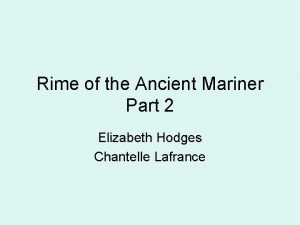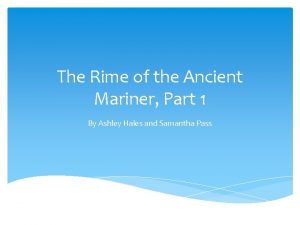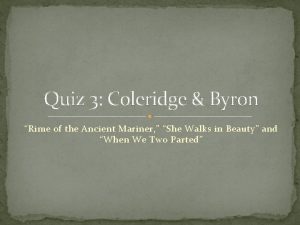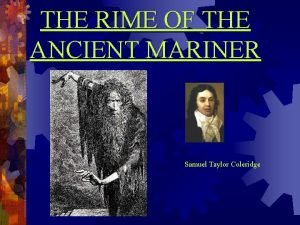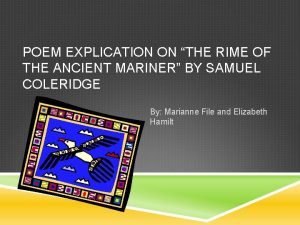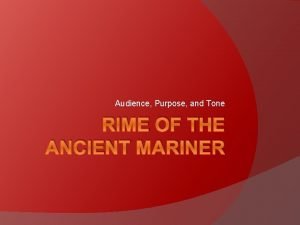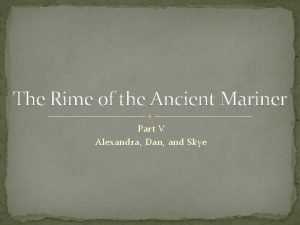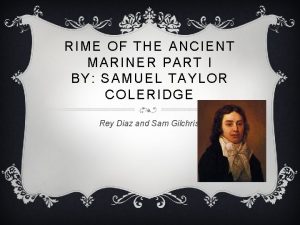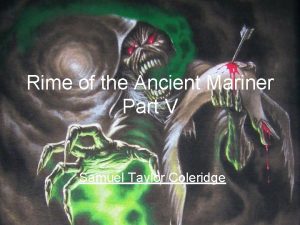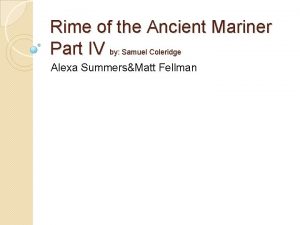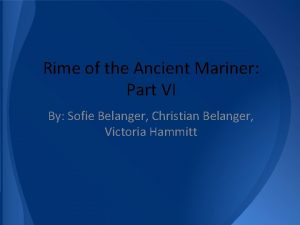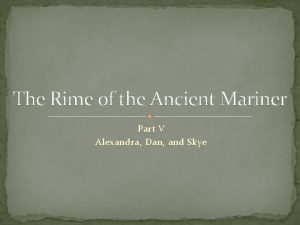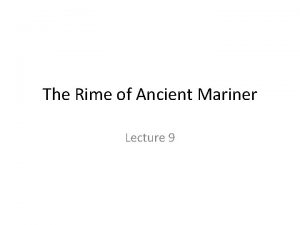The Rime of the Ancient Mariner Part 1













- Slides: 13

The Rime of the Ancient Mariner, Part 1 By Ashley Hales and Samantha Pass

About the Author Samuel Taylor Coleridge: October 21, 1772 -July 25, 1834 He studied at Jesus College where he met lifelong friend Robert Southley, who influenced a lot of his work. He was good friends with William Wordsworth and collaborated with him on many poems and compositions. He went to Göttingen college and learned German. He was addicted to opium and married Southley’s fiancée's sister, and later fell in love with Wordsworth’s wife’s sister.

It is an ancient Mariner, And he stoppeth one of three. `By thy long grey beard and glittering eye, Now wherefore stopp'st thou me? Higher and higher every day, Till over the mast at noon -" The Wedding-Guest here beat his breast, For he heard the loud bassoon. The bridegroom's doors are opened wide, And I am next of kin; The guests are met, the feast is set: Mayst hear the merry din. ' The bride hath paced into the hall, Red as a rose is she; Nodding their heads before her goes The merry minstrelsy. He holds him with his skinny hand, "There was a ship, " quoth he. `Hold off! unhand me, grey-beard loon!' Eftsoons his hand dropped he. The Wedding-Guest he beat his breast, Yet he cannot choose but hear; And thus spake on that ancient man, The bright-eyed Mariner. He holds him with his glittering eye The Wedding-Guest stood still, And listens like a three years' child: The Mariner hath his will. "And now the storm-blast came, and he Was tyrannous and strong: He struck with his o'ertaking wings, And chased us south along. The Wedding-Guest sat on a stone: He cannot choose but hear; And thus spake on that ancient man, The bright-eyed Mariner. With sloping masts and dipping prow, As who pursued with yell and blow Still treads the shadow of his foe, And foward bends his head, The ship drove fast, loud roared the blast, And southward aye we fled "The ship was cheered, the harbour cleared, Merrily did we drop Below the kirk, below the hill, Below the lighthouse top The sun came up upon the left, Out of the sea came he! And he shone bright, and on the right Went down into the sea. And now there came both mist and snow, And it grew wondrous cold: And ice, mast-high, came floating by, As green as emerald. And through the drifts the snowy clifts Did send a dismal sheen: Nor shapes of men nor beasts we ken The ice was all between. The ice was here, the ice was there, The ice was all around: It cracked and growled, and roared and howled, Like noises in a swound! At length did cross an Albatross, Thorough the fog it came; As it had been a Christian soul, We hailed it in God's name. It ate the food it ne'er had eat, And round and round it flew. The ice did split with a thunder-fit; The helmsman steered us through! And a good south wind sprung up behind; The Albatross did follow, And every day, for food or play, Came to the mariner's hollo! In mist or cloud, on mast or shroud, It perched for vespers nine; Whiles all the night, through fog-smoke white, Glimmered the white moonshine. " `God save thee, ancient Mariner, From the fiends that plague thee thus! Why look'st thou so? ' -"With my crossbow I shot the Albatross. "

Literal Sense There was once an ancient mariner, who stopped one of three men on the way to a wedding. “With your long beard and your glittering eyes, why have you stopped me? The doors to the ceremony are opening and everything is ready, ” said the man. “There was a ship…” the mariner began. “Let go of me!” cried the man, and the mariner let go, but held him with his gaze. He realized he didn’t have a choice but to stay, and he sat down like a three-year-old child to listen. The mariner began his story. “ Everyone on the ship was in good spirits when the ship left the harbor, and we sailed past the church, the hill, and the lighthouse. The sun rose the next morning from the left, as if it had come out of the sea. At the end of the day it set to the right, and each day it seemed to rise higher during the day, ” The man became distressed as he realized that he was missing the wedding. He wanted to leave, but something held him there, forcing him to listen. The mariner went on. “A huge storm came, chasing us south. It became very cold, and we saw mist, snow, and gigantic icebergs. We were suddenly in the middle of the ice; it was everywhere and made loud cracking sounds. After some time, an albatross flew over the ship, and we were overjoyed to see it. It followed us for nine nights, and along with it came clear weather. ” The mariner paused, and the man asked him why he looked sickly. The mariner replied with, ” I shot the albatross with my crossbow. ”

Diction The Rime of the Ancient Mariner uses concrete, very vivid language to create an image in the reader’s mind. Its language may have been colloquial (common) during its time, but it uses many words that are now considered obsolete. Examples of these are thee, thou, stopp’st, hath, and quoth. The poem also creates vivid expressions by inverting word order, like “Out of the sea came he!” in line 26 and “the ship roared fast, loud roared the blast” in line 49.

Tone and Mood The Rime of the Ancient Mariner evokes a feeling, or mood, of danger, adventure, and the supernatural. The emotions range from happy and merry to somber in the poem as it progresses, but throughout it possesses an undertone of mystery. The poem has a serious, nostalgic tone. There is no irony in part one of the poem, except maybe the fact that while the albatross was bringing good fortune, the mariner shot it.

Rhetorical Situation The poem’s speakers include the narrator, the mariner, and the wedding guest. The mariner is the primary speaker, and he is speaking to the wedding guest in order to tell him a story. The poem begins with the narrator speaking directly to the reader, but after the first two lines the reader is not spoken to. The mariner speaks solely to the wedding guest and the reader has no part in the poem.

Figurative Language Similes “like a three-years’ child” “red as a rose” “As green as emerald. ” Personification “The sun came up…out of the sea came he! And he shone bright …” “And now the storm blast came, and he was tyrannous and strong…” “Growled and roared and howled…”

Imagery The Rime of the Ancient Mariner uses vivid imagery to create mental images of what the mariner and his shipmates saw during their voyage. Sight: “long grey beard and glittering eye” ; “brighteyed” ; “shone bright”; “the ice, mast-high…green as emerald”, “the ice was all between” Touch: “it grew wonderous cold” Hearing: “ it cracked and growled, and roared and howled”

Symbolism The albatross: symbolizes good or bad luck The storm: symbolizes an actual predator chasing the boat

Sound Rhyme: The poem uses internal rhyme. Ex. “ the sun shone bright, and on the right” Repetition: It repeats the phrase “the wedding guest here beats his breast” Alliteration: “red as a rose”; “did…dismal”; “round and round”; “south wind sprung up” Assonance: “ice was all around” Onomatopoeia: “cracked and growled, and roared and howled” Euphony

Structure The poem is divided into 7 parts Some stanzas have four lines , and some have five or six In the ones with four, the second and fourth usually rhyme In the ones with five or six, the second or third rhymes with the last.

Works cited http: //www. cummingsstudyguides. net/G uides 3/Rime. html http: //www. shmoop. com/rime-of-ancient -mariner/part-1 -summary. html http: //www. shmoop. com/rime-of-ancient -mariner/symbolism-imagery. html http: //www. onlineliterature. com/coleridge/ Jonas
 Rime of the ancient mariner part 2
Rime of the ancient mariner part 2 Nicole rime
Nicole rime Summary of the rime of the ancient mariner part 1
Summary of the rime of the ancient mariner part 1 The rime of the ancient mariner part 3
The rime of the ancient mariner part 3 Part 3 rime of the ancient mariner
Part 3 rime of the ancient mariner The rime of the ancient mariner analysis
The rime of the ancient mariner analysis The rime of the ancient mariner meter
The rime of the ancient mariner meter Rime of the ancient mariner ending
Rime of the ancient mariner ending All in a hot and copper sky the bloody sun at noon
All in a hot and copper sky the bloody sun at noon Why does the mariner stop one of three
Why does the mariner stop one of three Rime of the ancient mariner paraphrase
Rime of the ancient mariner paraphrase Short summary of the rime of the ancient mariner
Short summary of the rime of the ancient mariner Samuel taylor coleridge the rime of the ancient mariner
Samuel taylor coleridge the rime of the ancient mariner The rime of the ancient mariner tone
The rime of the ancient mariner tone
